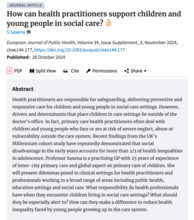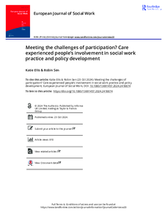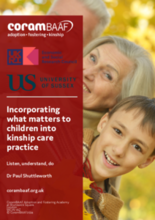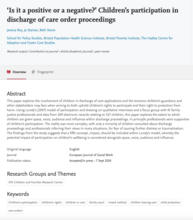Displaying 51 - 60 of 1185
This briefing looks at what data and statistics are available about children in care to help professionals, and the organisations they work for, make
evidence-based decisions.
This study explores risk and resilience in UK school environments for students in kinship care. Eight professionals experienced in working with students in kinship care and their schools took part in individual, semi-structured interviews. Interviews focussed on kinship students’ needs and how professionals perceive schools respond to those needs.
The author of this article is a practising GP with 25 years of experience of inner-city primary care and a global expert on primary care of children and she presents dilemmas posed in clinical settings for health practitioners and professionals working in a broad range of areas including public health, education settings and social care to help reduce health inequality faced by young people growing up in the UK care system.
This paper considers attempts to influence practice and policy from the perspectives of 15 care experienced people who had been involved in substantive public campaign work relating to children in state care and care leavers in Scotland and England. Participants shared their experiences of working to influence change and highlighted good and bad practice that they had encountered working with different individuals and organisations claiming to promote the views of those with lived experience.
This paper highlights the experiences of birth mothers who have children placed in kinship care in the UK, focusing on some of the specific challenges they face. For many kinship families, these issues are also felt by the kinship carer. The paper sets out the need to do more to support kinship families - children, kinship carers and birth parents - to ensure children can thrive in safe, stable and loving homes.
This kinship care practice guidance was developed by listening to children's views. It is a practical guide to listening to children living in kinship families to help ensure that their voices and views are heard and acted upon. It is intended primarily for those who support children and families in kinship care arrangements, but it also applies to other areas of child welfare practice.
This study explores Ukrainian responses to internally displaced people during the first and second waves of war-induced displacement and internal migration in Ukraine, which took place after the annexation of Crimea in 2014 and after the full-scale invasion of 2022. It also addresses the unique challenges faced by Ukrainian social work professionals in supporting displaced people, service people and their families, disabled veterans, and orphaned children as the war continues and also for resettlement in a post-war context.
This paper explores the involvement of children in discharge of care applications and the tensions children’s guardians and other stakeholders may face when aiming to both uphold children’s rights to participate and their right to protection from harm.
All under-18s have now been removed from Scotland's young offenders institutions and transferred to more child-friendly settings. The change follows suicides of young people while detained and the passage of a new law that bans children being sent to prison.








